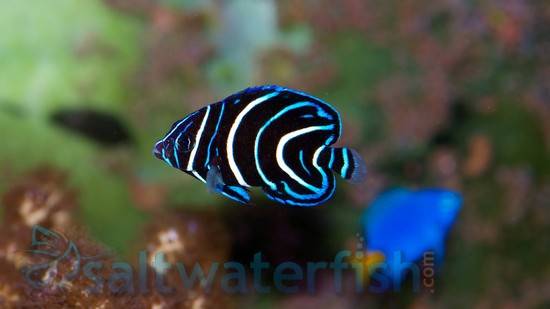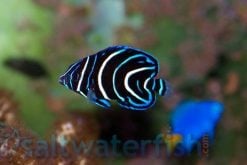Koran Angelfish: Juvenile – (Pomacanthus semicirculatus)
Quick Stats:
– Care Level: Moderate
– Temperament: Semi-aggressive
– Diet: Omnivorous – Reef Safe: No
– Minimum Tank Size: 100 gallons
– Maximum Size: Up to 15 inches
The Koran Angelfish, also known as the Semicircle Angelfish, is a popular choice among saltwater aquarium enthusiasts. This comprehensive guide will provide you with all the necessary information to successfully care for this species in your saltwater aquarium.
Habitat:
The Koran Angelfish is native to the Indo-Pacific region, particularly around the coasts of Indonesia and the Philippines. They are typically found in coral reefs and lagoons, where they seek shelter and feed on a variety of algae and small invertebrates.
Reef Safe:
The Koran Angelfish is not considered reef safe. They have a tendency to nip at corals and other sessile invertebrates, which can cause damage to the reef ecosystem in a home aquarium. It is best to house them in a fish-only or FOWLR (Fish Only With Live Rock) setup.
Size:
As adults, Koran Angelfish can reach a maximum size of up to 15 inches. They can grow quite rapidly, so it is important to provide them with a spacious tank to accommodate their size.
Temperament:
The Koran Angelfish is considered semi-aggressive. While they may show aggression towards smaller or more passive tankmates, they can coexist peacefully with larger, more robust fish species. It is important to observe their behavior and provide suitable tankmates to minimize any potential conflicts.
Sexual Dimorphism:
There are no significant differences in appearance between male and female Koran Angelfish. They both display the same vibrant coloration and patterns.
Lifespan:
The average lifespan of a Koran Angelfish in captivity is around 10 to 15 years. With proper care and a suitable environment, they can live a long and healthy life.
Diet in Aquariums:
The Koran Angelfish is an omnivorous species, which means they require a varied diet. In the wild, they primarily feed on algae, small invertebrates, and coral polyps. In a captive environment, it is important to offer a combination of high-quality pelleted or flaked foods, frozen or live foods such as brine shrimp or mysis shrimp, and occasional seaweed or algae sheets to mimic their natural diet.
Aquascaping Recommendations:
When setting up a tank for Koran Angelfish, it is important to provide plenty of hiding places and open swimming areas. Utilize live rock formations to create caves or crevices where the fish can find shelter. Additionally, incorporating some areas with macroalgae or other types of algae can provide a natural grazing area for the angelfish.
Captive Bred Availability:
The Koran Angelfish is not commonly available as a captive-bred species. Most individuals found in the aquarium trade are wild-caught. However, efforts are being made to breed them in captivity to reduce the impact on wild populations.
Compatibility with Other Tankmates:
When choosing tankmates for the Koran Angelfish, it is important to consider their semi-aggressive nature. Avoid keeping them with smaller, more timid fish species that may become targets of aggression. Instead, opt for larger, more robust fish that can hold their own. Some suitable tankmates for the Koran Angelfish include:
- Yellow Tang: The Yellow Tang is a popular choice as they are peaceful and can withstand the occasional aggression from the Koran Angelfish.
- Powder Blue Tang: These tangs have a similar level of aggression and size, making them compatible tankmates for the Koran Angelfish.
- Sailfin Tang: Sailfin Tangs are known for their resilience and can handle the occasional aggression from the Koran Angelfish.
- Blue Tang: Blue Tangs are a larger species that can coexist peacefully with the Koran Angelfish.
- Yellowtail Damselfish: These small, territorial fish can hold their own against the Koran Angelfish and are a colorful addition to the tank.
These are just a few examples of suitable tankmates, but always monitor the behavior of all inhabitants to ensure compatibility.
Other Common Names:
The Koran Angelfish is also commonly known as the Semicircle Angelfish or the Halfmoon Angelfish.
Why Buy from Reefs4Less.com
Reefs4Less.com is a reputable online retailer specializing in saltwater aquarium supplies. Here are a few reasons why you should consider buying from them:
- Wide Selection: Reefs4Less.com offers a wide range of products for saltwater aquarium enthusiasts, including fish, corals, equipment, and accessories.
- Quality Assurance: They ensure that all their products are of high quality, ensuring the health and well-being of the animals and the success of your aquarium.
- Knowledgeable Staff: The staff at Reefs4Less.com are well-versed in saltwater aquarium care and can provide expert advice and guidance to help you make informed purchasing decisions.
- Convenience: Shopping online at Reefs4Less.com allows you to browse and make purchases from the comfort of your own home, with convenient shipping options available.
- Customer Satisfaction: Reefs4Less.com prioritizes customer satisfaction and strives to provide exceptional service before, during, and after your purchase.
Popular Questions and Answers:
Q: Can the Koran Angelfish be kept in a reef tank?
A: No, the Koran Angelfish is not considered reef safe due to its tendency to nip at corals and other sessile invertebrates.
Q: How big do Koran Angelfish grow?
A: Koran Angelfish can reach a maximum size of up to 15 inches.
Q: What is the lifespan of a Koran Angelfish?
A: In captivity, Koran Angelfish can live for around 10 to 15 years with proper care.
Q: Can Koran Angelfish be kept with other aggressive fish?
A: While the Koran Angelfish is semi-aggressive, it is important to choose tankmates that are similarly sized and can hold their own against any potential aggression.
Q: Are there any special requirements for feeding a Koran Angelfish?
A: Koran Angelfish require a varied diet that includes high-quality pelleted or flaked foods, frozen or live foods, and occasional seaweed or algae sheets to mimic their natural diet.
| Size | 1.25 – 2 inches |
|---|



Reviews
There are no reviews yet.